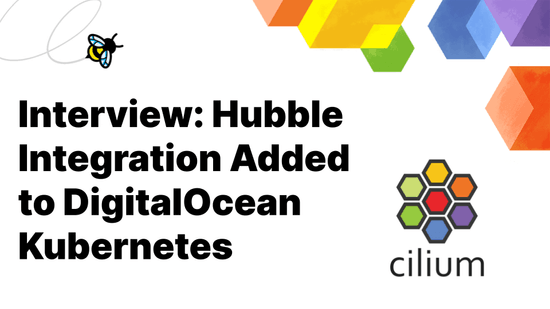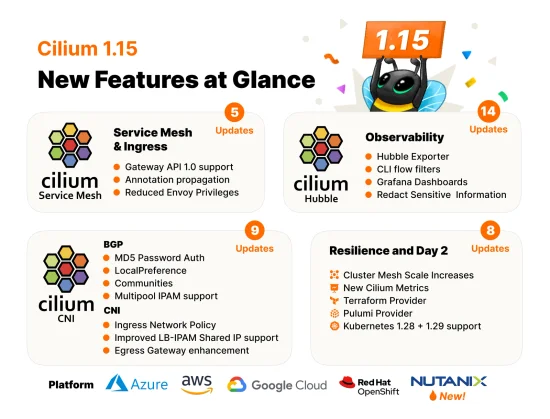Cilium 1.0.0-rc4 released
We are excited to have released Cilium 1.0.0-rc4. The release contains a lot of bugfixes as usual plus a lot of CI work to ensure quality long term but there are also some enhancements highlights and tooling worth mentioning.
As usual, the full release notes are attached at the end of the blog but can be found on the 1.0.0-rc4 release page. Here is a list of some highlights:
Envoy is the default HTTP/gRPC proxy \o/

We have finally ripped out the old custom HTTP proxy and made Envoy the default proxy for all L7 enforcement of HTTP and gRPC traffic. In the months up to this we have extended Envoy in various ways to
-
Introduction of listener filters to allow running filters per listener to retrieve per connection metadata. We use this to read metadata from BPF maps and make the L3/L4 forwarding context of Cilium available to Envoy. See PR
-
Addition of the original destination cluster type to allow configuring Envoy in a completely transparent manner so whenever a connection is redirected to Envoy, Envoy will always forward to whatever was the original destination of the redirected connection. See PR
-
Allow tying the HTTP version of an upstream connection to whatever HTTP version the downstream connection is using. This allows preserving full transparency. See PR
-
Allow HTTP filters to have read access to the downstream connections. See PR
Simple health overview for connectivity and other errors
Cilium, like the majority of distributed systems software, is driven by events and notifications. Cilium react to events such as addition of a new policy, appearance of a new security identity in the cluster, removal of a container on the local node, and so on. Unfortunately things can and will go wrong. The kvstore can be become unreachable temporarily, the Kubernetes apiserver can crash, cluster nodes can get rebooted, ... Therefore, code that is associated with such events will eventually fail. How should we notify you as a user? The obvious answers are:
-
Not at all, the code should be written in a resilient manner and retry on failure to eventually recover.
-
The error messages indicating the failure are logged to a logfile.
While resilience is great and logfiles allow to reconstruct all actions
retrospectively, it makes it hard to know at a specific point in time, how well
the cluster is doing right now. For this purpose, we have introduced what
we call "controller status" to the cilium status output:
$ cilium status
[...]
Controller Status (0/2 failing)
Name Last success Last error Count Message
sync-identity-to-k8s-pod (56326) 36s ago never 0 no error
sync-identity-to-k8s-pod (29898) 32s ago never 0 no errorThis will allow to give an immediate overview of what is failing right now, why
it is failing and how often it has been retried. Right now, the cilium status
command is available on each node. We will provide a cluster wide tool in one of
the next releases.
Another common source for overall cluster health issues are defects in the network
fabric itself which result in connectivity problems. To allow for simple and
effective monitoring, we have introduced cilium-health:
$ cilium-health status
Probe time: 2018-02-06T19:40:16Z
Nodes:
k8s1 (localhost):
Host connectivity to 192.168.36.11:
ICMP: OK, RTT=1.258166ms
HTTP via L3: OK, RTT=434.173µs
Endpoint connectivity to 10.10.0.172:
ICMP: OK, RTT=1.266885ms
HTTP via L3: OK, RTT=554.219µs
k8s2:
Host connectivity to 192.168.36.12:
ICMP: OK, RTT=1.53503ms
HTTP via L3: OK, RTT=2.420321ms
Endpoint connectivity to 10.10.1.172:
ICMP: OK, RTT=2.081433ms
HTTP via L3: OK, RTT=6.550839msA full blog post on this feature can be found here
Improved scalable kvstore interaction layer
The last big change is a heavily improved interaction layer with the kvstore. We will provide a dedicated blog post on the exact details along with proper documentation, the highlights are:
-
All keys inserted by agents to manage the allocation of security identities for endpoints and pods are now protected by leases which means that if a node running an agent goes down and never comes up, the keys will eventually expire and the kvstore will not end up cluttered with unused keys.
-
The process of allocating a security identity has become a lot more lightweight and requires less locking. With etcd 3.3 we hope to provide a completely lockless operation exclusively depending on conditional transactions to improve scalability even further.
-
A new
cilium kvstorecommand gives easy access to all kvstore keys and values.
Release Notes
Major Changes
- api: Introduce & expose endpoint controller statuses (#2720, @tgraf)
- More scalable kvstore interaction layer (#2708, @tgraf)
- Add agent notifications & access log records to monitor (#2667, @tgraf)
- Remove oxyproxy and make Envoy the default proxy (#2625, @jrajahalme)
- New controller pattern for async operations that can fail (#2597, @tgraf)
- Add cilium-health endpoints for datapath connectivity probing (#2315, @joestringer)
Bugfixes Changes
- Avoid concurrent access of rand.Rand (#2823, @tgraf)
- kafka: Use policy identity cache to lookup identity for L3 dependant rules (#2813, @manalibhutiyani)
- envoy: Set source identity correctly in access log. (#2807, @jrajahalme)
- replaced sysctl invocation with echo redirects (#2789, @aanm)
- Set up the k8s watchers based on the kube-apiserver version 2731 (##2735, @aanm)
- bpf: Use upper 16 bits of mark for identity (#2719, @tgraf)
- bpf: Generate BPF header in order after generating policy (#2718, @tgraf)
- Kubernetes NetworkPolicyPeer allows for PodSelector and NamespaceSelector fields to be optional. (#2699, @ianvernon)
- Gracefully handle when these objects are nil when we are parsing NetworkPolicy.
- Enforce policy update immediately on ongoing connections 2569 #2408 (##2684, @aanm)
- envoy: fix rule regex matching by host (#2649, @aanm)
- Kafka: Correctly check msgSize in ReadResp before discarding. (#2637, @manalibhutiyani)
- Fix envoy deadlock after first crash (#2633, @aanm)
- kafka: Reject requests on empty rule set (#2619, @tgraf)
- CNP CRD schema versioning (#2614, @nebril)
- Fix race while updating L7 proxy redirect in L4PolicyMap (#2607, @joestringer)
- Don't allow API users to modify reserved labels for endpoints. (#2595, @joestringer)
Release binaries
- cilium-agent-x86_64 (c58a3a05d8531bd8f677)
- cilium-bugtool-x86_64 (5ba0547857d71a96d99c)
- cilium-health-x86_64 (f0015f1345e9bb7eccec)
- cilium-node-monitor-x86_64 (81e189969dcf2a97aca3)
- cilium-x86_64 (2f63b204753aa7a96bb0)
- v1.0.0-rc4.tar.gz (39ff5357ea5920af6bca)
- v1.0.0-rc4.zip (1c371d84ccad990c6915)
As usual, let us know on Slack if you have any questions.


